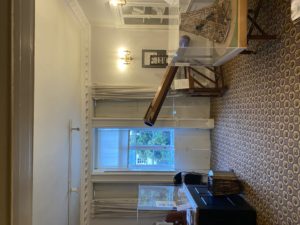Four or five years ago I was wandering around Bristol when I saw someone who looked like Geoff Dyer walking up the street. I knew it couldn’t be Dyer because he lived in Los Angeles, but scurried up behind this lookalike, overtook him and walked by again, this time trying to get a closer look. It was him, of course.
He was there to promote his latest book White Sands – I soon discovered he’d be in Waterstones later that day giving a talk, so I went along. I’ve followed Dyer’s career for many years. I’d heard him on the radio reading from one of his earliest books, a novel, The Search. The book was disappointing, a bit flat, but nevertheless Dyer’s voice, his take on things had stayed with me, so when he started to find his feet as a non-fiction writer, I soon followed. And I loved what he wrote. Out of Sheer Rage is a sort of non-biography of DH Lawrence. Dyer is researching Lawrence, has an advance, a deadline, but he can’t get the book finished, so instead writes a book about not writing a book. Dyer is very good at not doing things. Hence the title of a later book Yoga for People Who Can’t Be Bothered to Do It.
In the spirit of Dyer I didn’t buy a signed copy of White Sands and still don’t own a copy. It was serialised as Radio Four’s Book of the Week, I’d also picked it up several times in bookshops to flick through it. There’s a chapter on not seeing the Northern Lights. It was another book of nots. So I was not buying it.
Last week Dyer turned up in Bath to promote his new book The Last Days of Roger Federer which, as Dyer was keen to explain, is not a book about tennis. This is a book about endings, but not abrupt endings, but declines. How someone’s decline sets in long before things end completely. It’s a book about finitude. About ageing, and about time. The book is 86,400 words long, the same number as there are seconds in a day. Nietzsche, for example, lived long after his madness set in, and Bob Dylan, according to Dyer, still makes records long after he has since being any good at all.
So is Dyer in decline too? He admits to feeling a bit creaky: he plays tennis but his knee is messed up. He had a mild stroke some years ago (he mentioned it at the Bristol talk), but his mind seems still capable of pinpoint accuracy. He is extremely funny, most of his books are smart but some are hilarious too, and in Bath he talked for almost an hour and his performance was worthy of stand up. Certainly funnier than Ricky Gervais’ Supernature.
I bought a signed copy of The Last Days of Roger Federer but like many of my signed first editions, I won’t read it. I’ll keep it on my shelf, out of the sunlight, and it’ll stay there until my last days when my son or daughter will come and throw it in a box and take it to a charity shop.
